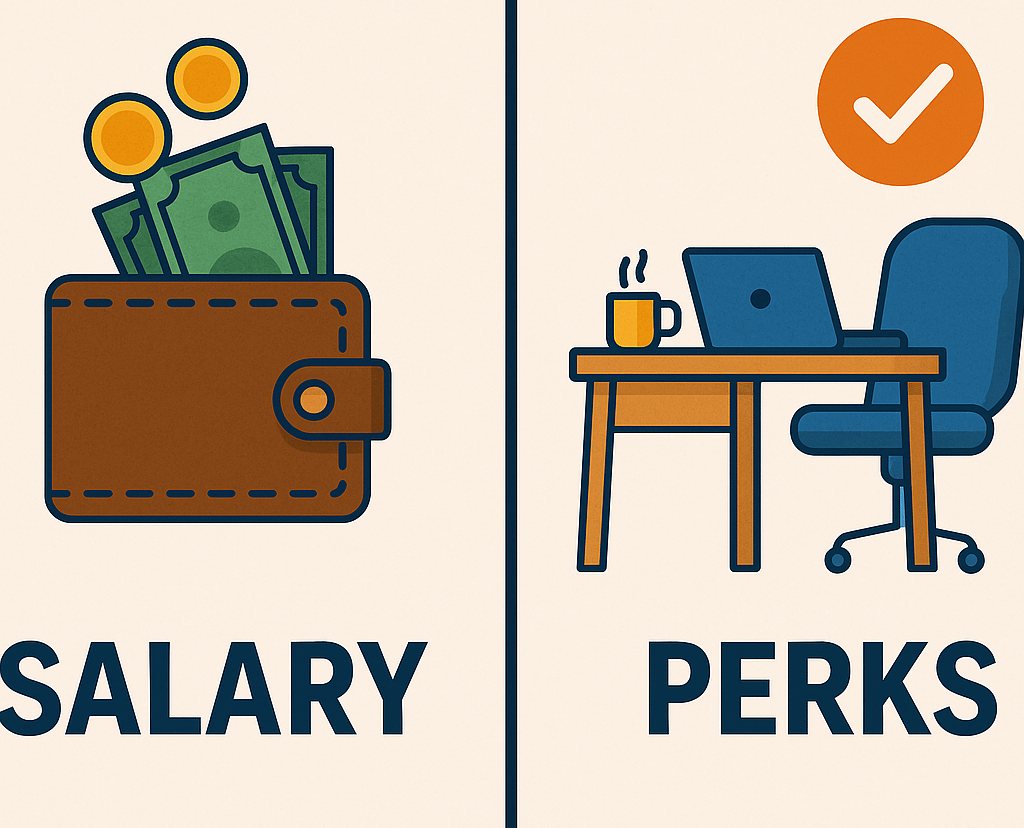Perks or Salary: What Pays Off in 2025? Evaluate Total Compensation Smartly
Saurodeep
5/27/20254 min read


Perks or Salary: What Pays Off in 2025?
In 2025, compensation is no longer a one-dimensional metric. Job seekers today are not just comparing base salary numbers—they are evaluating full compensation packages that include health benefits, flexible work models, equity, bonuses, learning allowances, and other non-cash perks. In this landscape, one question arises more often than ever: should you negotiate for a higher salary, or accept a more generous perks package?
The answer depends on more than just numbers. It lies in your current needs, future goals, tax implications, job tenure expectations, and how you define long-term value.
Understanding Compensation in 2025
Traditionally, salary has been viewed as the primary component of compensation. It is fixed, predictable, and easily measurable. However, with workplace evolution driven by hybrid roles, inflation, digital wellbeing, and generational workforce shifts, employees are now prioritizing total compensation, not just gross pay.
A total compensation package may include:
Fixed salary (monthly or annual)
Variable pay or performance bonuses
Equity (ESOPs or RSUs)
Health insurance and wellness coverage
Work-from-home or hybrid allowances
Learning reimbursements
Leave policies and flexibility
Travel or relocation support
Companies are offering increasingly customized packages based on role criticality and retention strategy. For professionals, the challenge is determining which components will deliver greater value over time.
When Salary Matters More
There are clear instances where maximizing salary makes sense. For professionals with short-term financial goals—such as repaying education loans, planning a large purchase, or supporting dependents—a higher take-home pay offers more immediate control and liquidity. It allows for greater flexibility in how and where the money is used, including personal investment strategies or wealth planning.
Moreover, base salary impacts your ability to qualify for loans, calculate retirement contributions, and build credit. It is the foundation for many other financial decisions and benefits.
A higher fixed salary may be ideal when:
You need consistent monthly income
Your financial priorities include loan repayments or large expenses
You are in a stage of wealth accumulation
You plan to change jobs within a short time
The perks offered are not personally relevant or accessible
When Perks Add Greater Long-Term Value
For professionals seeking balance, growth, and lifestyle alignment, perks can often add more real-world value than a marginal salary increase. Comprehensive health insurance, generous paid leave, flexible work arrangements, and wellness allowances not only reduce personal expenses but also contribute to overall wellbeing and job satisfaction.
Stock options or equity, when offered by a growing company, have the potential to generate far higher returns than annual salary increments—especially if you remain with the company over the vesting period.
In 2025, many professionals are also prioritizing:
Mental health support and burnout prevention
Family-centric benefits such as parental leave or childcare
Flexibility in location and working hours
Structured career development support
These are not always quantifiable in the short term, but they play a significant role in retention, productivity, and long-term fulfillment.
Perks may be more valuable when:
You value flexibility, learning, or wellness support
Your company offers high-potential stock options
The tax-adjusted salary difference is minor
You plan to stay for the medium or long term
Emotional wellbeing and balance are priorities
How to Assess True Compensation Value
To determine what pays off, professionals must go beyond the gross salary figure and calculate the full monetary and lifestyle impact of their compensation.
Start by assigning approximate values to benefits you would actually use. For example:
A ₹2 lakh insurance policy may save you ₹20,000 annually
₹3,000/month WFH stipend saves ₹36,000 annually
Equity with a vesting schedule can provide long-term wealth
Paid learning or course reimbursements are career investments
Next, consider taxation. A higher salary may push you into a new tax bracket, while some perks are non-taxable or tax-exempt. In India, reimbursements for internet, phone bills, travel, and health checkups are often not taxed if structured properly.
You should also assess your likely tenure. If your benefits are tied to long-term retention (e.g., ESOPs, annual bonuses, sabbaticals), they only deliver value if you stay long enough to receive them.
The Psychological Component: What the Payslip Does Not Show
Beyond financial value, 2025 has seen a shift toward evaluating the emotional return on employment. Professionals are increasingly aware of how work impacts their health, relationships, and identity.
While salary may offer short-term motivation, meaningful perks contribute to:
Reduced stress and better health outcomes
Improved work-life integration
Access to upskilling and growth opportunities
Feeling of being valued and invested in by the employer
For this reason, many high-performance companies are creating customized perks portfolios, understanding that what motivates a parent may differ from what a digital nomad seeks.
Employer Perspective: Strategic Compensation
From the employer’s viewpoint, salary increases represent recurring, compounding fixed costs. Perks, on the other hand, are often flexible, scalable, and performance-based. They can also be more tax-efficient for the company and better aligned with engagement or retention metrics.
In 2025, competitive employers offer a hybrid compensation model: a solid base salary with personalized perks and flexible benefit structures.
Organizations that allow employees to choose between various benefits (such as increased PF contributions vs. leave buyout vs. stock options) see higher retention and satisfaction scores.
Making the Right Decision
There is no universal answer to whether perks or salary are better. The right approach is to:
Define your current financial goals and life stage
Calculate both short-term value and long-term gain
Consider tax, lifestyle, and retention implications
Evaluate whether perks align with your real needs
Understand the vesting, usage, and limitations of non-cash benefits
Ultimately, the smartest professionals balance both. They negotiate salaries that reflect their value, while also leveraging benefits that improve their quality of life and long-term potential.
Final Thoughts
In 2025, compensation is not just about what you earn—it’s about what you gain. A higher salary may serve immediate goals, but a thoughtful package of perks can drive motivation, retention, and long-term financial advantage.
The right choice is the one that supports your financial strategy, your career path, and your personal priorities. And that decision begins not with numbers, but with clarity.
About One Solution
Quick Links
Contact Info
One Solution — Your trusted partner for financial success.
📍 F17, Grand Plaza, Paltan Bazar
Guwahati, Kamrup (M), Assam
India, Pin: 781008
📞 9650072280
© 2025 One Solution. All Rights Reserved.
